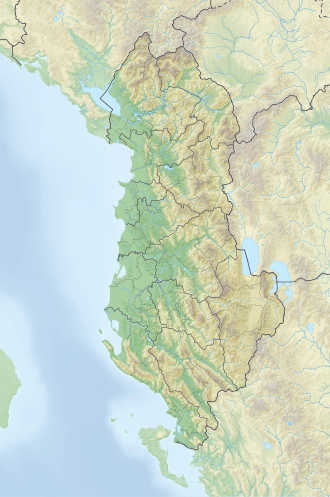Cape of Rodon
Rocky cape in Albania From Wikipedia, the free encyclopedia
The Cape of Rodon or Cape of Skanderbeg (Albanian: Kepi i Rodonit or Kepi i Skenderbeut) is a rocky cape on the Adriatic Sea north of Durrës, Albania.[3] On the cape is the Rodoni Castle, built by Skanderbeg in 1463,[4] and Saint Anthony Church. Further south in the bay between the cape and Rrushkull Reserve there exist several beach resorts like “Lura” and “San Pietro Resort”, gathering a considerable amount of tourists during the summer months.
| Cape of Rodon | |
|---|---|
 Map of the Cape of Rodon | |
| Location | Southern Europe |
| Coordinates | 41°35′9″N 19°26′59″E |
| Ocean/sea sources | Adriatic Sea, Mediterranean Sea |
| Basin countries | Albania |
| Settlements | Durrës |
 | |
| Location | Cape of Rodon, Albania |
|---|---|
| Coordinates | 41°35′03″N 19°26′59″E |
| Tower | |
| Constructed | 1884 (first) |
| Foundation | concrete base |
| Construction | metal lamp post |
| Height | 3 m (9.8 ft) |
| Shape | cylindrical lamp post[1] |
| Markings | grey metal post with light atop[2] |
| Power source | solar power |
| Light | |
| First lit | 2007 (current) |
| Focal height | 40 m (130 ft) |
| Range | 8 nmi (15 km; 9.2 mi) |
| Characteristic | Fl(2) W 10s |
Name
The name Redon appears in ancient inscriptions found in Santa Maria di Leuca (present-day Lecce), and on coins minted by the Illyrian city of Lissos, suggesting that he was worshipped as the guardian deity of the city,[5] and probably as a sea god.[6] The fact that Redon was always depicted on coins wearing a petasos demonstrates a connection with travelling and sailing, which led historians to the conclusion that Redon was the deity protector of travellers and sailors.[7] Indeed, the inscriptions of Santa Maria di Leuca were carved by the crews of two Roman merchant ships manned by Illyrians.[8] Inscriptions mentioning Redon were also found on coins from the Illyrian cities of Daorson and Scodra, and even in archaeological findings from Dyrrhachium after the establishment of a Roman colony there.[7] His name keeps on being used in the Albanian Kepi i Rodonit, which could be analysed as an Illyrian sanctuary dedicated to the god of the sailors in the past.[9]
See also
Wikimedia Commons has media related to Cape of Rodon.
Sources
Wikiwand - on
Seamless Wikipedia browsing. On steroids.

